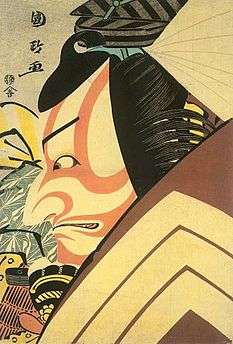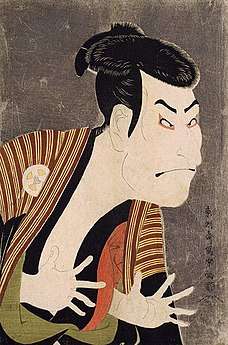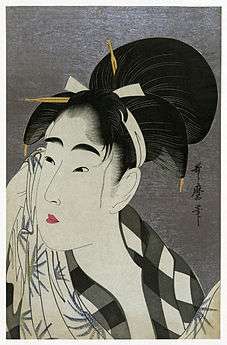Ōkubi-e
An ōkubi-e (Japanese: 大首絵) is a Japanese portrait print or painting in the ukiyo-e genre showing only the head or the head and upper torso. Katsukawa Shunkō I (1743–1812) is generally credited with producing the first ōkubi-e. He, along with Katsukawa Shunshō, designed ōkubi-e of male kabuki actors. In the early-1790s, Utamaro designed the first ōkubi-e of beautiful women (bijin-ga ōkubi-e). The shogunate authorities banned ōkubi-e in 1800, but the ban was lifted after eight years.
Gallery
- Ōkubi-e of kabuki actor Matsumoto Kōshirō IV as Tsurunosuke, a woodblock print by Katsukawa Shunkō I
 Woodblock print by Utagawa Kunimasa of kabuki actor Ichikawa Ebizō in a shibaraku role, 1796
Woodblock print by Utagawa Kunimasa of kabuki actor Ichikawa Ebizō in a shibaraku role, 1796 Nakazō Nakamura II as Edobee, woodblock print by Sharaku, 1794
Nakazō Nakamura II as Edobee, woodblock print by Sharaku, 1794 Woman Wiping Sweat, woodblock print by Utamaro, 1798
Woman Wiping Sweat, woodblock print by Utamaro, 1798 Portrait of Hagiwara Sakutarō, woodblock print by Onchi Kōshirō, 1943
Portrait of Hagiwara Sakutarō, woodblock print by Onchi Kōshirō, 1943
gollark: ```RUSTU SS UTSUR```
gollark: Trust Rust™
gollark: RUST
gollark: RUSTUST
gollark: RUST
References
- Newland, Amy Reigle. (2005). Hotei Encyclopedia of Japanese Woodblock Prints. Amsterdam: Hotei. ISBN 9789074822657; OCLC 61666175
- Roberts, Laurance P. (1976). A Dictionary of Japanese Artists. New York: Weatherhill. ISBN 9780834801134; OCLC 2005932
This article is issued from Wikipedia. The text is licensed under Creative Commons - Attribution - Sharealike. Additional terms may apply for the media files.